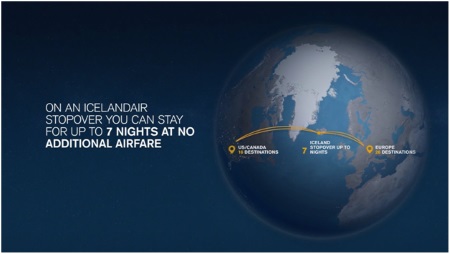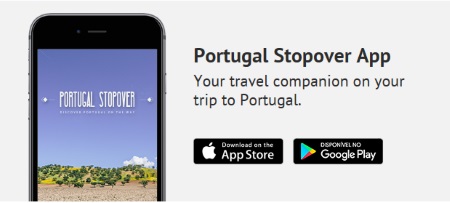
Airlines can innovate the stopover experience with mobile
By cameron in Uncategorized
This is a viewpoint from Robert Meza, head of travel at the ENTERTAINER.
With the Aviation Festival taking place in London this week, and with so many airlines, startups and technology companies coming together, I thought it would be interesting to take a look at a huge opportunity airlines are failing to grasp – stopover programmes.
Stop start
Airline stopover programs are nothing new. Icelandair was one of the pioneers of this type of program. Back in the mid-1960’s they were offering passengers travelling between North America and Europe the chance to stay for a few days in Iceland at no cost.
The idea of such an initiative was to help bolster tourism for the country. However, it was not until the 2000’s that the program really started to take off in a big way, as more and more people got curious about taking advantage of the free and of what Iceland could offer as a destination.
With the favorable results of the program from Icelandair, more and more airlines began to take notice and to ask themselves if such programs could help them and their home countries in the same way.

Noticeable programs
Since the Icelandair stopover launch, many airlines moved to develop similar programs of their own, in hopes to replicate the success of Icelandair.
But airlines need to understand that simply offering stopover options to passengers does not guarantee success. The design and proposition of the program will determine its real success.
Nevertheless, it is good to mention some of the most noticeable airlines to develop programs:
- Air Canada: This stopover program started with letting travelers stay in Toronto for up to seven days and discover the city, it has since extended to a few other Canadian cities.
- Finnair: Travellers can stay up to five days on trips to Europe and Asia. They can get a hotel, an activity from a partner and transfers to and from the airport to the hotel.
- Etihad: Although not free, you can stay in Abu Dhabi for a few days for a very discounted price and then explore things like Yas Island, The Louvre or the Grand Mosque.
- TAP: Travelers who stop in Portugal are offered things like free wine in selected restaurants as well as a free activity to do in the city for the duration of the stopover.
The main thing that leaps out, to me at least, is the lack of innovation of these programs, and the fact that for some reason the airlines have not moved towards a fully mobile experience, which is how their passengers really expect to be engaged.
A Xennial, or those a bit younger than me, the Millennials for example, start to plan their trips including their stopover experience on their mobile. This is where they are getting inspiration, discovering the city and things to do.
Yet what is being delivered to travellers by airlines when it comes to these stopover programs does not provide a connected digital and mobile experience that has personalisation and data at the center.
Most of these programs – and I will leave out the ones who have in the past asked passengers to send a form and wait for three days – don’t have anything connected back to an app, or a bot that can deliver the right experience, the way travellers today expect and demand.
More so, most outsource the in-destination activities to third party websites where they are supposed to buy physical cards and passes, thus making the passenger leave the environment of the airline so that someone else can take them.
The only airline that I could see had at least attempted to keep the experience in-house was TAP Portugal with its Stopover app, although the content is a bit on the light side, and with no redemption process to keep a digital record of the offers used in say restaurants, or an easy way for people to book activities and keep their tickets in the app.

So, for all the success these program can bring (as shown by Icelandair) almost none of the airlines seem to be innovating or using mobile, data or ancillaries to leverage engagement and ultimately loyalty.
The mobile and in-destination opportunity
As I wrote in my previous article, the fact is that mobile is pushing innovation in the travel industry like never before, and nowhere is this clearer than in the in-destination market.
Airlines are in a strong position as they are often the first to know where people are headed and when. The data is there for the taking.
But airlines must develop the right mobile platforms to take advantage of this opportunity by providing a seamless experience to their passengers, including those opting for a stopover. This means being able to offer several important things:
- The ability to buy tours and activities and attractions via mobile or use miles to earn or burn on these
- The ability to plan days and pin their favourite things to do and to dream of doing
- Guides to the city, maps and offline functionality
- Savings at restaurants and spa which are easily redeemed
- Special curated and unique tips about the destination
All of these things should stay within the ecosystem of the airline, and then be tied to the passenger and their preferences, the loyalty program (or sign them up to one) so that personalisation can be applied and more relevant offerings can be presented the passengers.
The data opportunity and tourism boards
Using mobile to capture data around what passengers like to do, where they go, and what they enjoy, together with anonymised but demographic insights, has other uses. The data could then be shared and used by tourism boards and the likes to better target their marketing campaigns and make sure that they are reaching the right audience at the right time.
The idea of monetizing data is nothing new – Uber for example has been selling transportation data to governments and city planners. What is interesting to point out here is that this data is not new data that never existed, taxi companies have been sitting on this data for a long time, but never thought about the possibilities of what the data could be used for.
Airlines seem, reluctant to capture and use their data. The danger for them is that there are younger, hungrier and more innovative companies who will jump in and fill the gaps for the travellers, who today expect to do everything on mobile.
The question is going to be, who will the travellers choose to engage with?
Beyond the stopover
Airlines are not only promoting stopover programs with a view to tapping the in-destination experience of their passengers. Airlines such as Emirates via their My Emirates Pass and Singapore Airlines both have boarding pass programs where they offer rewards, discounts and other perks to passengers in the destination at restaurants, spas and attractions.
The problem here, again, is that the experience is purely analogue, and it misses all the data, engagement and ancillary opportunities that a well designed mobile driven experience could deliver.
Will they push to innovate?
More airlines should take notice and start working towards digitising their stopover and in-destination initiatives. This will not only meet the expectations of their passengers but also build the foundation for programs that will be successful for years to come.
I am curious to see what airlines are already thinking and planning these changes towards a mobile and digital experience and what the focus at the show will be as a whole.
This is a viewpoint by Robert Meza, head of travel at the ENTERTAINER. It appears as part of the tnooz sponsored content initiative.
![]()

